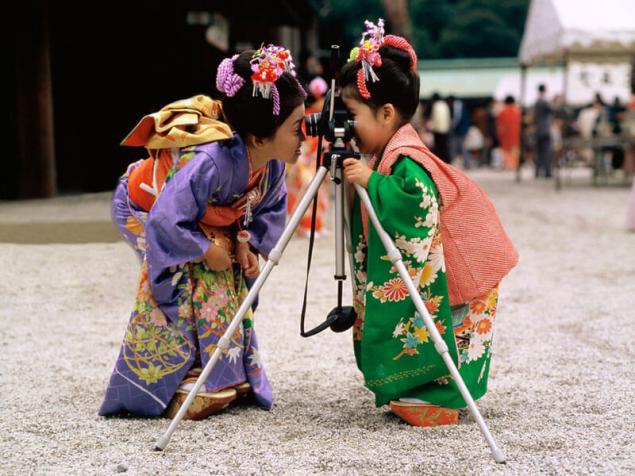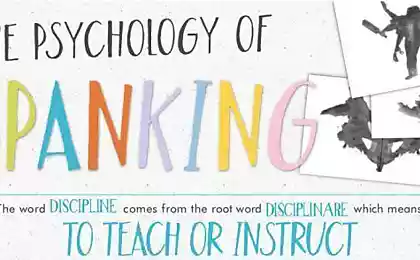514
How to raise children in other countries
Why the Japanese can't imagine my life outside of the collective, Americans are tolerant, and the French are too independent. It's all in the upbringing.
1 Japan
Japanese children live in three stages: God – slave – equal. After five years of "REC" and almost absolute permissiveness (within reason, of course), probably not easy to pull yourself together and start to follow the common system of rules and restrictions.
Only 15 years to Chad's beginning to treated as equal, wanting to see him as a disciplined and law-abiding citizen. Lecturing, yelling or corporal punishment – all these non-pedagogical "charms" Japanese children are deprived. The worst punishment is "playing coy" is adults just for a while stop with the baby to communicate. Adults try to dominate children, do not seek to show their power and strength, maybe that's why throughout the life of the Japanese idolize their parents (especially mothers) and try not to give them trouble.

In 50-e years of last century in Japan has released a revolutionary book "Training the talent". With the filing of its author, Masaru Ibuka, in the country first began to talk about the necessity of early development of children. Based on the fact that in the first three years of life, a personality of a child, parents must create conditions for the realization of his abilities. The feeling of belonging to a community – that's important for all Japanese without exception. It is not surprising that parents preach one simple truth: "alone is easy to get lost in the intricacies of life".
However, minus the Japanese approach to education is obvious: life on the principle "as all" and group consciousness do not give your personality a chance.
2 France
The main feature of the French system of education – early socialization and independence of children. Many French can only dream about a long-term maternity leave because they are forced to leave earlier for work. French manger ready to take the kids at the age of 2-3 months. Despite the care and love, parents can say, "No!". Adult children require discipline and unquestioning obedience. Enough a glance to the kid "returned to normal". Young French always say the "magic words", quietly waiting for the lunch or starchy crawling in the sandbox, while their mothers talk with friends. To play pranks parents do not pay attention, but for a major infraction punish "ruble": deprived of entertainment, gifts or sweets.
Excellent study of the French system of education presented in the book, Pamela Druckerman "French children don't spit food." Indeed, European children are very obedient, calm and independent. Problems arise in cases where parents are overly fond of their own personal life – then alienation cannot be avoided.
3 Italy
Children in Italy is not just love. They idolize! And not only their own parents and many relatives, but also outsiders. To say something to a child, pinch his cheeks or to "scare goat" is considered to be in the order of things.
To go to kindergarten for three years, until that time it is likely to be under the "watchful" control or grandparents, aunts or uncles, cousins, nieces and all other relatives. "Bring the light" children begin very early – take them to concerts, to restaurants, to weddings.To make a point, not to mention the subduing slap, unacceptable behavior for a parent. If you constantly pull up the baby, it will grow a notorious — think Italian parents. Such a strategy sometimes ends with shame: absolute permissiveness leads to the fact that many children have no idea about common rules of decency.
4 India
The Indians begin to raise their children almost from birth. The most important quality that parents want to see their kids, kindness. By example they teach children to be patient with others, keep their emotions in all situations. Adults try to hide it from the kids in a bad mood or fatigue. Good thoughts should be permeated the whole life of the child: a warning "do not crush an ant and don't throw stones at birds" transformered to "not oppress the weak, and respect your elders". The highest praise a child not worthy when it became "better than another", and when it became "better themselves". While Indian parents are very conservative, for example, they flatly refuse to accept the introduction in the school curricula for modern disciplines.
Raising children has always been regarded in India as the prerogative of the state, and be relegated to parents who could raise a child in accordance with their beliefs, including religious ones.
5 America
Americans have qualities that are easy to give them "the crowd": inner freedom peacefully coexist with political correctness and a clear adherence to the letter of the law. The desire to be closer to the child, to understand the problems and interested in the success crucial aspects of American life-parents. It is no coincidence that on any kindergarten school party or football game you can see a large number of dads and moms with cameras in hand. The older generation in the education of the grandchildren did not participate, but mom possibly prefer the work of caring for family.
From an early age, the child is taught tolerance, why to adapt, for example, special children in the community are quite simple. A clear advantage of the American system of education is the informality and the desire to focus on practical knowledge.
Tattling, which is perceived negatively in many countries, in America called "law-abiding" to inform on those who broke the law, it is considered completely natural. Corporal punishment is society are censured, and if the child complains to parents and present "evidence" (bruises or abrasions), the actions of adults can be construed as illegal with all the ensuing consequences. As punishment, many parents use the popular technique of "timeout" when the child is asked to silently sit and think about their behavior. published
P. S. And remember, only by changing their consumption — together we change the world! © Join us at Facebook , Vkontakte, Odnoklassniki
Source: russian7.ru/2015/10/kak-vospityvajut-detej-v-drugih-stranah/
1 Japan
Japanese children live in three stages: God – slave – equal. After five years of "REC" and almost absolute permissiveness (within reason, of course), probably not easy to pull yourself together and start to follow the common system of rules and restrictions.
Only 15 years to Chad's beginning to treated as equal, wanting to see him as a disciplined and law-abiding citizen. Lecturing, yelling or corporal punishment – all these non-pedagogical "charms" Japanese children are deprived. The worst punishment is "playing coy" is adults just for a while stop with the baby to communicate. Adults try to dominate children, do not seek to show their power and strength, maybe that's why throughout the life of the Japanese idolize their parents (especially mothers) and try not to give them trouble.

In 50-e years of last century in Japan has released a revolutionary book "Training the talent". With the filing of its author, Masaru Ibuka, in the country first began to talk about the necessity of early development of children. Based on the fact that in the first three years of life, a personality of a child, parents must create conditions for the realization of his abilities. The feeling of belonging to a community – that's important for all Japanese without exception. It is not surprising that parents preach one simple truth: "alone is easy to get lost in the intricacies of life".
However, minus the Japanese approach to education is obvious: life on the principle "as all" and group consciousness do not give your personality a chance.
2 France
The main feature of the French system of education – early socialization and independence of children. Many French can only dream about a long-term maternity leave because they are forced to leave earlier for work. French manger ready to take the kids at the age of 2-3 months. Despite the care and love, parents can say, "No!". Adult children require discipline and unquestioning obedience. Enough a glance to the kid "returned to normal". Young French always say the "magic words", quietly waiting for the lunch or starchy crawling in the sandbox, while their mothers talk with friends. To play pranks parents do not pay attention, but for a major infraction punish "ruble": deprived of entertainment, gifts or sweets.
Excellent study of the French system of education presented in the book, Pamela Druckerman "French children don't spit food." Indeed, European children are very obedient, calm and independent. Problems arise in cases where parents are overly fond of their own personal life – then alienation cannot be avoided.
3 Italy
Children in Italy is not just love. They idolize! And not only their own parents and many relatives, but also outsiders. To say something to a child, pinch his cheeks or to "scare goat" is considered to be in the order of things.
To go to kindergarten for three years, until that time it is likely to be under the "watchful" control or grandparents, aunts or uncles, cousins, nieces and all other relatives. "Bring the light" children begin very early – take them to concerts, to restaurants, to weddings.To make a point, not to mention the subduing slap, unacceptable behavior for a parent. If you constantly pull up the baby, it will grow a notorious — think Italian parents. Such a strategy sometimes ends with shame: absolute permissiveness leads to the fact that many children have no idea about common rules of decency.
4 India
The Indians begin to raise their children almost from birth. The most important quality that parents want to see their kids, kindness. By example they teach children to be patient with others, keep their emotions in all situations. Adults try to hide it from the kids in a bad mood or fatigue. Good thoughts should be permeated the whole life of the child: a warning "do not crush an ant and don't throw stones at birds" transformered to "not oppress the weak, and respect your elders". The highest praise a child not worthy when it became "better than another", and when it became "better themselves". While Indian parents are very conservative, for example, they flatly refuse to accept the introduction in the school curricula for modern disciplines.
Raising children has always been regarded in India as the prerogative of the state, and be relegated to parents who could raise a child in accordance with their beliefs, including religious ones.
5 America
Americans have qualities that are easy to give them "the crowd": inner freedom peacefully coexist with political correctness and a clear adherence to the letter of the law. The desire to be closer to the child, to understand the problems and interested in the success crucial aspects of American life-parents. It is no coincidence that on any kindergarten school party or football game you can see a large number of dads and moms with cameras in hand. The older generation in the education of the grandchildren did not participate, but mom possibly prefer the work of caring for family.
From an early age, the child is taught tolerance, why to adapt, for example, special children in the community are quite simple. A clear advantage of the American system of education is the informality and the desire to focus on practical knowledge.
Tattling, which is perceived negatively in many countries, in America called "law-abiding" to inform on those who broke the law, it is considered completely natural. Corporal punishment is society are censured, and if the child complains to parents and present "evidence" (bruises or abrasions), the actions of adults can be construed as illegal with all the ensuing consequences. As punishment, many parents use the popular technique of "timeout" when the child is asked to silently sit and think about their behavior. published
P. S. And remember, only by changing their consumption — together we change the world! © Join us at Facebook , Vkontakte, Odnoklassniki
Source: russian7.ru/2015/10/kak-vospityvajut-detej-v-drugih-stranah/
























